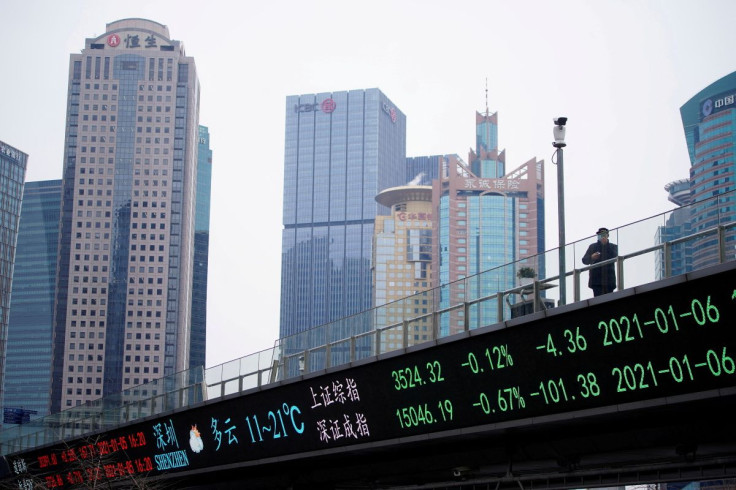Stocks, Dollar Rise; European Leaders Urge Further Moscow Sanctions

Stocks on global indexes rose on Monday, with the Nasdaq leading gains on Wall Street, while the U.S. dollar strengthened as European leaders urged further sanctions against Moscow following war crime allegations in Ukraine.
Investors were closely watching the yield curve between U.S. two-year and 10-year notes, which inverted last week in a signal for some market watchers that a recession may follow in one to two years.
More sanctions against Russia would ratchet up the already huge economic pressure on Russia over its invasion of Ukraine.
Russia maintained gas flows through key pipeline routes into Europe, despite uncertainty over payment terms.
The dollar gained, rising for three straight sessions, as the prospect of increased sanctions pushed investors to seek safety in the greenback.
"The dollar is bouncing higher as geopolitical developments have darkened clouds over the global economy," said Joe Manimbo, senior market analyst at Western Union Business Solutions in Washington. The Kremlin denied accusations related to the murder of civilians in Ukraine.
The U.S. currency also continued to benefit from a strong non-farm payrolls report for March that backed expectations for a half of a percentage point rate hike by the Federal Reserve at next month's meeting.
The dollar index rose 0.245%.
The euro, which has been under pressure due to worries about the economic damage from the war in Ukraine, fell 0.6% versus the dollar to $1.0988. Against sterling, the euro fell to a six-day low and it was last down 0.6% at 83.73 pence.
On Wall Street, news that Tesla Inc Chief Executive Officer Elon Musk has built a 9.2% stake in Twitter Inc took the spotlight and sent Twitter shares surging.
The Dow Jones Industrial Average fell 3.76 points, or 0.01%, to 34,814.51, the S&P 500 gained 21.62 points, or 0.48%, to 4,567.48 and the Nasdaq Composite added 213.94 points, or 1.5%, to 14,475.44.
The pan-European STOXX 600 index rose 0.93% and MSCI's gauge of stocks across the globe gained 0.65%.
In the U.S. Treasury market, two-year yields were at 2.44%, while benchmark 10-year yields were at 2.41%.
The recent jump in U.S. bond yields has backed the U.S. dollar, particularly against the yen, given the Bank of Japan acted repeatedly last week to keep its bond yields near zero.
On the U.S. economic front, the Commerce Department said factory orders fell 0.5% in February. Data for January was revised slightly higher to show orders rising 1.5% instead of 1.4% as previously reported. Economists polled by Reuters had forecast factory orders would decline 0.5%.
Oil jumped over 3% as the release of strategic reserves by consuming nations failed to eliminate supply fears arising from Russia's invasion of Ukraine and the lack of an Iranian nuclear deal.
U.S. crude recently rose 3.52% to $102.76 per barrel and Brent was at $107.58, up 3.06% on the day.
© Copyright Thomson Reuters 2024. All rights reserved.




















